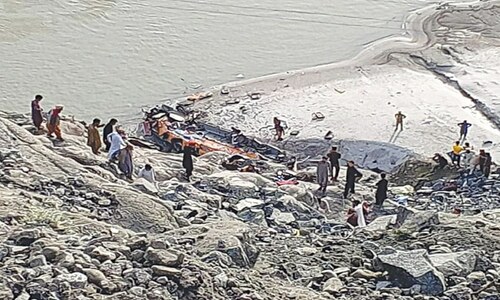LAHORE: Prime Minister Nawaz Sharif ordered the suspension of three top officials of the petroleum ministry and the PSO chief on Saturday in connection with the week-long petrol shortage in Punjab.
On his return from Saudi Arabia, the prime minister called a meeting to review the crisis which has virtually paralysed life in Punjab.
After getting a briefing from the officials concerned, Mr Sharif suspended Petroleum Secretary Abid Saeed, Additional Secretary Naeem Malik, Director General (Oil) C.M. Azam and Amjid Janjua, Managing Director of the Pakistan State Oil.
Musadiq Malik, the premier’s spokesman, told a TV channel that an investigation had been launched to fix responsibility for the crisis.
Asked if the federal petroleum minister would be shown the door if he was found responsible for the problem, he said: “A thorough investigation will fix the responsibility.”
Mr Malik said some oil tankers were expected to reach Punjab from Karachi by Sunday evening. “The situation will somehow improve on Monday.”
Meanwhile, the oil crisis prompted Punjab Chief Minister Shahbaz Sharif to ‘request’ Federal Minister for Petroleum and Natural Resources Shahid Khaqan Abbasi to open CNG stations across the province for at least two days to ease out the situation.
HEART OF THE MATTER: The failure of the power sector to recover its dues lies at the heart of the current national oil crisis because it owes Rs190 billion (88.37 per cent) of the total Rs215bn receivables of the Pakistan State Oil and its own receivables (both from public and private sectors) stand at Rs587bn — three times more than what it owes.
Petrol shortage attributed to power sector’s failure to recover its dues
According to data compiled in November last year, of the total receivables of PSO, private customers owe Rs402bn, or 68.48pc. It is this amount where corruption and inefficiency in the sector play a major role for failing to recover the money.
“In the first five months (July-Nov) of the current financial year, the sector has cumulated a debt of Rs74.66bn — just under Rs15bn a month, or Rs500 million a day,” claims a former head of the Pakistan Electric Power Company.
The private default during the same period went up by Rs47bn to Rs402.272bn from Rs355.630bn. With this kind of recoveries, no sector can sustain itself for long and the government knew it well before hand. If Rs32bn default of K-Electric, which is a private entity, is also included in the private default, the total amount swells to Rs434bn.
“In 2012-13, the sectoral bill collection was 93.7pc. It fell to 89.7pc the next year and in July-Nov this year, it is down to 85.4pc,” says a former general manager (finance) of Wapda. This drop of Rs14.6bn in collection translates itself into a staggering Rs74.4bn.
The current crisis, which is now spreading to the entire economy, has taken down the PSO and it would cause a decline in power generation within days, which in turn would run the industry aground and subsequently the national economy.
It is unfortunate that the entire attention of the government is riveted on increasing generation whereas the existing infrastructure is collapsing by the day. The country has faced three major power breakdowns in six weeks because the national transmission and dispatch system is under huge pressure, even during the winters. The government is bent upon generating costliest electricity in the world but it cannot recover bills even from private consumers. Nobody has an idea how the government plans to run the sector, he claims.
“Not only the private customers, but the government agencies also do not pay their bills,” laments a former head of the National Transmission and Dispatch Company.
The federal government and its agencies owe Rs8.6bn, the Azad Jammu and Kashmir Rs45.7bn, Punjab Rs153bn, Sindh Rs65bn and Khyber Pakhtunkhawa Rs21bn. No one can recover Rs40bn from the Federally Administered Tribal Areas.
“It is a lethal combination of ad hocism, policy confusion and corruption that is running the sector down. The oil crisis is only one dimension, the rest (industrial decline, national economy and social chaos) would start unfolding in a few days,” he warned.
Published in Dawn January 18th , 2015
On a mobile phone? Get the Dawn Mobile App: Apple Store | Google Play














































